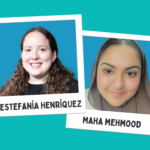MCH Leads Health Equity Edition – In order to advance health equity for MCH populations, beginning January 2023, MCH Leads will feature trainees’ health equity-focused work. We look forward to highlighting trainees’ experiences supporting the health and well-being of vulnerable and underserved populations and communities. Also, their work assessing and addressing the underlying causes of health disparities–and their efforts to promote diversity, equity, and inclusion–ultimately improving MCH outcomes. In addition, we encourage trainees to reflect on how the MCH Leadership Competencies are applicable to their health equity-focused stories.

Anastasia Woods (she/her) is a second-year Master of Science in Nursing (MSN) Candidate at Vanderbilt University School of Nursing studying to become a Certified Nurse-Midwife and Family Health Nurse Practitioner. In 2021, Anastasia was awarded the HRSA NHSC Scholarship, which aims to bolster the healthcare workforce by supporting culturally competent healthcare providers. In 2020, Anastasia earned her Master of Public Health (MPH) in Maternal and Child Health from Tulane University. Throughout her MPH experience, Anastasia participated in several community engagement efforts as a Tulane Center of Excellence in Maternal and Child Health (CEMCH) Scholar. Anastasia’s life-long commitment to addressing racial maternal health disparities stems from her undergraduate research experience; she earned her B.A. in public health and sociology at Franklin and Marshall College. Anastasia’s long-term career goal is to establish midwife and doula-centered birthing centers that provide holistic and affordable care to women of color, LGBT+ families, and low-income families. Connect with Anastasia via LinkedIn!
A Call for Rebirth Justice
We live in a country that prides itself on being a “developed” nation yet fails to address the stark racial outcomes in maternal mortality. According to the Centers for Disease Control and Prevention (CDC), Black women are 2-3 times more likely to die from pregnancy-related causes than white women. The racial disparity in maternal mortality is a direct by-product of structural racism, which further perpetuates discrimination within the healthcare sector. Before we can begin to address health inequities within maternal and child health (MCH), it is imperative that we understand Black birthing folks’ healthcare needs.
As a Tulane CEMCH scholar, I interned at the National Birth Equity Collaborative (NBEC), which is a national stakeholder that strives to promote health equity in MCH. I supported their Mothers’ Voices research project, which aimed to understand the nuances shaping Black birthing individuals’ healthcare experiences. The researchers conducted several focus groups to assess the patient-provider dyad and quality of healthcare experiences from a patient perspective. I worked alongside the data analyst team to code the qualitative findings based on four major themes: responsiveness to birth, birth expectations/priorities, social support/resources, and autonomy. Many participants shared unsatisfactory birthing experiences that spoke to the harmful impact of implicit bias, discrimination, and unsafe healthcare spaces. The results highlight the need for culturally competent, empathetic, and patient-centered healthcare providers to cultivate positive birth experiences. NBEC’s health equity efforts are critical to shed light on the unique needs of the Black community and promote change within the healthcare sector.
Understanding the historical, social, and political context of maternal health directly informs my public health interests and efforts. To effectively address the racial health inequities for birthing people, we must establish collaborative multidisciplinary teams that aim to execute patient and community-centered public health efforts. One of the ways I have enjoyed advancing reproductive justice in my hometown was through being an engaged member of the New Orleans MCH Coalition. Through volunteering with the coalition I have joined committees to foster legislative support for MCH-related bills, planned community engagement events, and learned about local governmental actions to improve health outcomes across Louisiana. As a first-year MPH student, I hosted a design thinking workshop for the coalition which used an intersectional approach to discuss constructive community engagement efforts that could improve local maternal health outcomes. My event demonstrated the benefit of using design thinking practices to inform public health planning.
Cultivating my Passion for Birth Work
Working alongside passionate birth workers and my local community inspired me to become a public health changemaker. In September 2019, I trained to become a community doula through Sista Midwife Productions. The training incorporated a multicultural approach that centered on the physical, psychological, and spiritual components of pregnancy for Black women. I learned best practices to empower families and promote positive pregnancy, birth, and postpartum experiences. I recognized the importance of having a person-centered advocate who actively aims to protect human rights and intentionally supports individual autonomy. The role of a doula reveals a nuanced perspective within the healthcare sector by helping to encourage a healthy patient-provider dyad. My doula and community engagement experiences ultimately pushed me to become a midwife as I want to promote change directly alongside birthing individuals.
As a first-year midwifery student, I continue to support positive birthing experiences as a doula in the Nashville Volunteer Doula Program. Our program offers free on-call doula support for Vanderbilt University Medical Center. I have enjoyed supporting families through the emotional and physical process of labor while also enhancing my midwifery education. My diverse public health experience has taught me that change-making is a multilayered continuum from macro efforts that use a population-level approach to micro-level grassroots efforts. The road to promoting health equity requires multifaceted collaboration that centers family and community needs.
#HealthEquity #ReproductiveJustice #RebirthJustice #BlackMamasMatter #MCHLeads

